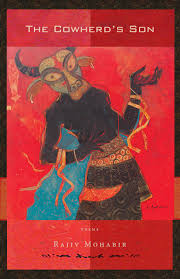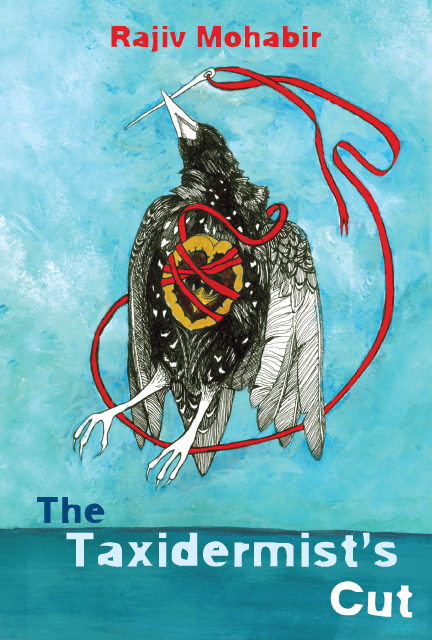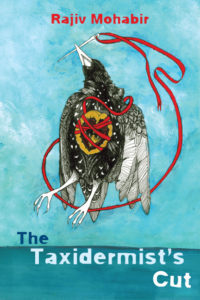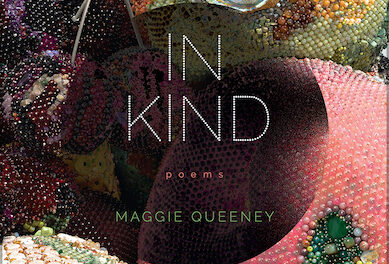Associate Editor Caitlin Doyle: As spring approaches and new books of poetry make their way into print, many of them by first-time authors, we’re abuzz in the CR office about debut collections from the recent past that have held us in thrall. In celebration of the season, I’m happy to highlight The Taxidermist’s Cut by poet Rajiv Mohabir (one of our miCRo contributors!) as a particularly memorable debut that landed on our bookshelves a few years ago and continues to call us back to its pages.
In The Taxidermist’s Cut (Four Way Books, 2016), Rajiv Mohabir draws startling parallels between animals and human beings. He frequently invites readers to consider how close we are, despite the trappings of civility by which we define our species, to creatures that live in the wild. In a haunting poem titled, “The Complete Tracker,” we follow a hunter as he tracks deer through the woods. He comes across the following sentence in his guidebook: “Every creature / that moves on the earth leaves / a mark of its passing.” Reminding us that our own marks on the world are no less ephemeral than those of other animals, Mohabir ends the poem on an image of the tracker’s “footprints . . . covered over / by leaves and other men’s heavy soles.” In another striking piece titled “Trip Line,” Mohabir juxtaposes the detail of a “stag fooled by / a hunter’s call” with the speaker’s first sexual experience: “I still trip on the clear voice / of the first man who scraped off my soft casing.” Violence and desire merge throughout The Taxidermist’s Cut as Mohabir explores what happens when living bodies of any kind come into contact with each other.
Mohabir also uses the art of taxidermy as a figurative vehicle through which to explore issues of race, ethnicity, and assimilation, as he does in the book’s titular poem, “The Taxidermist’s Cut,” in which we encounter the following image: “Cover your own skin with the hide that does not hide. / Place your arms in the empty pelt and sew yourself up.” He addresses this directive to the poem’s speaker, who has meditated for several pages on the struggles of occupying brown skin in a dominantly white world. By stepping into a new set of skin, Mohabir suggests, the speaker can paradoxically find both concealment and freedom (living within a “hide that does not hide”). There is much to admire in the taut craft, emotional veracity, and philosophical complexity of these poems. Mohabir charges language with a tension-filled combination of tenderness and ferocity that makes his poems pulse on the page.
 The Taxidermist’s Cut received the 2014 Four Way Books Intro Prize in Poetry, and Mohabir’s second book The Cowherd’s Son (Tupelo, 2017), also highly recommended by our entire staff, was the winner of the 2015 Kundiman Poetry Prize. We’re always on the lookout here at the CR for compelling debut collections that, much like The Taxidermist’s Cut, promise to turn readers into lifelong devotees of a poet’s oeuvre. For that reason, we’re especially excited about the following highly anticipated forthcoming books, all of them by debut poets whose work has already wowed us in literary journals, magazines, and online venues:
The Taxidermist’s Cut received the 2014 Four Way Books Intro Prize in Poetry, and Mohabir’s second book The Cowherd’s Son (Tupelo, 2017), also highly recommended by our entire staff, was the winner of the 2015 Kundiman Poetry Prize. We’re always on the lookout here at the CR for compelling debut collections that, much like The Taxidermist’s Cut, promise to turn readers into lifelong devotees of a poet’s oeuvre. For that reason, we’re especially excited about the following highly anticipated forthcoming books, all of them by debut poets whose work has already wowed us in literary journals, magazines, and online venues:
Tap Out by Edgar Kuntz (forthcoming from Houghton Mifflin Harcourt)
Brute by Emily Skaja, winner of the Walt Whitman Award (forthcoming from Graywolf Press). We can’t help but be extra jazzed about Brute because we’re proud to have Emily Skaja as one of our classmates in the University of Cincinnati PhD program!
The Milk Hours by John James, winner of the Max Ritvo Poetry Prize (forthcoming from Milkweed Editions)
The Tenant of Fire by Ryan Black, winner of the Agnes Lynch Starrett Poetry Prize (forthcoming from University of Pittsburgh Press)
The Year of Blue Water by Yanyi, winner of the Yale Series of Younger Poets competition (forthcoming from Yale University Press)
Library of Small Catastrophes by Alison C. Rollins (forthcoming from Copper Canyon Press)
We hope you’ll join us in relishing these books when they hit the presses!












